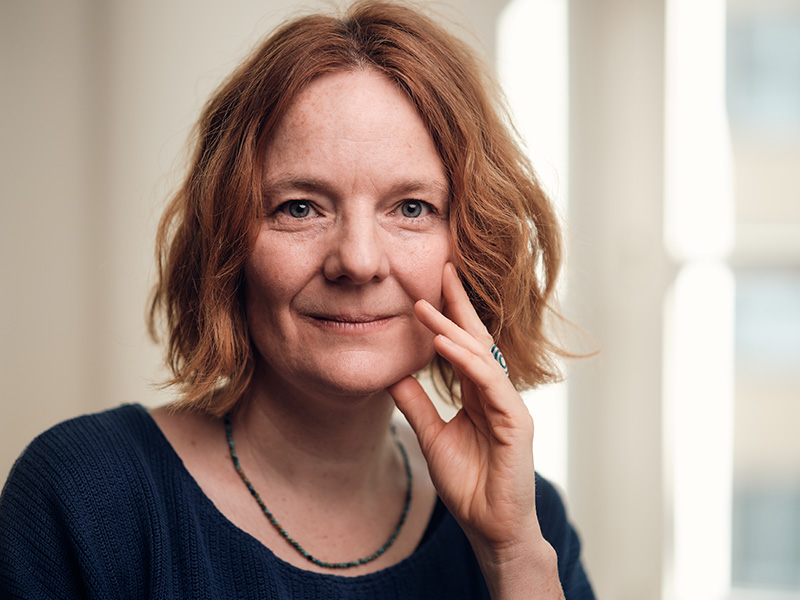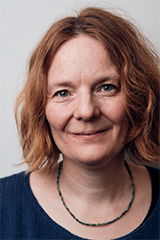History of Migration
Francesca Falk: Against the Blinding Evidence of the Present
In her new book, historian Francesca Falk investigates how a society defines “Us” and draws social boundaries. In this interview, she explains how, against the “evidence” (or obviousness) of the present, historical scholarship offers a different view on the here and now.

Francesca Falk, your book is entitled Gegen die blendende Evidenz der Gegenwart – Geschichte, die in die Zukunft weist [“Against the Blinding Evidence of the Present: History with a View to the Future”]. What’s your problem with evidence?
Francesca Falk: I have no problem with evidence understood as empirical data! But the term “evidence” has different meanings. It can also mean what is apparent or seemingly obvious, thus referring to what we don’t question. Historical scholarship as I defend it removes the obviousness of things, giving us sunglasses, as it were, against the blinding evidence of the present.
So it isn’t that easy to learn from the past?
Historical scholarship with a view to the future does not assume that we can learn from the past simply by extrapolating. Such a conception would not do justice to the complexity of historical phenomena.
Historical scholarship as you understand it is not only interested in what the world was and is like, but also in what it could be like. What do you mean by that?
History shows us that there has always been social change, again and again. Present conditions have historical causes and they are what they are. But they could be different.
Taking a historical perspective makes us see the present in a different way. Thus, it also opens up different visions of the future. Without that knowledge, we become prisoners of the here and now. Our options for perception are restricted by the ways of thinking of our age.
Could you give an example?
Someone from Geneva living in Bern can vote in local and cantonal elections and ballot measures here. It wasn’t always like that. From our present point of view it seems unacceptable that she would have been barred from voting in the past. Today, it goes without saying that Swiss citizens including women can join in the political process at their place of residence, even if it is not their place of origin. Taking a historical point of view can raise awareness of the fact that democratic deficits often aren’t perceived as such by contemporaries.
«It is by migration that Switzerland has become what it is today. »
Francesca Falk
I investigate the motives and mechanisms of drawing political and social boundaries, and their various consequences. The continuing negotiation of who is part of “Us” and thus has certain rights, and who is not, is a fundamental social process. The book is also an opportunity for me to express my understanding of history in a concentrated form.
In your book, you call for a “migranticization of history” and the “de-migranticization of people”. How are we to understand that?There is a certain paradox regarding migration. Many people in a society are migranticized – basically reduced to their “being foreign”, with it being constantly questioned whether they belong, even if they have become naturalized citizens. I call for “de-migranticizing” these people.
In what situations are people “migranticized”?When someone committed an act of violence, for instance. Often, the causes of the behavior of people who are seen as “migrants” are then sought in their allegedly different culture. With “locals”, on the other hand, alternative explanations such as by reference to mental disorders are given. So the behavior of people considered foreign is attributed to the “foreign collective,” while the behavior of “locals” is interpreted on the basis of personal factors.
The same behavior is explained differently.Right. At the same time, the constitutive dimension of migration is often deleted from history. But it is also by migration that Switzerland has become what it is today, if we think of eating habits, agriculture, the construction of major transportation and energy infrastructures, or the creation of Switzerland as a hub of knowledge, culture, industry, financial services and commerce.
«The behavior of people considered foreign is attributed to the ‘foreign collective,’ while the behavior of ‘locals’ is interpreted on the basis of personal factors.»
Francesca Falk
In 1970, the voters of Switzerland, still only men at the time, narrowly rejected a ballot measure against “foreign infiltration”, the so-called Schwarzenbach Initiative. Around a third of foreign workers in Switzerland – some 300,000 people – were threatened with deportation. When recalling the vote on the Schwarzenbach Initiative, the focus often is not on these people, but on the right-wing populist James Schwarzenbach who initiated it. Fifty years after the vote, it felt urgent to us to change perspective.
You interviewed the people affected by the initiative?Yes, we explored how they experienced the debates at the time and how those experiences affected their lives. Some of the contemporary witnesses reported that they had become politicized by the vote. They told us of the communities that organized and fought for their rights. To describe this phenomenon, we chose the term “Schwarzenbach effect.” Similar tendencies can be observed in connection with other measures like the popular initiative “Against Building Minarets.”.
«Scholarship taking a critical stance is dependent on democratic conditions, otherwise the researchers’ life and limb may be in danger.»
Francesca Falk
In our time, in particular, I lay stress on a careful introduction to source criticism and critical reading. This gives students skills for evaluating information more generally. In order to function, democracies are dependent on such skills being widespread in society.
Also, scholarship taking a critical stance is dependent on democratic conditions, otherwise the researchers’ life and limb may be in danger. So they have to advocate for “democracy” from a scholarly survival instinct as well. History shows us that democratic achievements are vulnerable and always at risk.. A job counselor once advised you against studying history…Before graduating from high school, I was torn between studying history and studying law. The job counselor very firmly advised me against “no future” studies of history; he said I could still cultivate that interest as a hobby. The advice session served its purpose: Afterwards, I was sure that I wanted to study history.
Have you ever regretted your choice of subject?No. There’s nothing you can’t also look at from a historical perspective. I like being able to follow my curiosity wherever it leads me.
About Francesca Falk

Francesca Falk is a lecturer in the History of Migration at the University of Bern. She has studied, taught and conducted research at various universities in Switzerland and elsewhere. She has received several awards for her publications and teaching. Her research interests cover a broad range of topics in social and cultural history, including migration, power structures, shifts in societal consensus, as well as public, visual and oral history. She is also vice-president of the Swiss History Society, where she heads the academic policy department.
Contact: Dr. Francesca Falk, francesca.falk@unibe.ch
Details of the book
Francesca Falk (2025), Gegen die blendende Evidenz der Gegenwart: Geschichte, die in die Zukunft weist.
The book was published by Seismo on April 11, 2025 and in Open Access (free PDF download), link: https://doi.org/10.33058/seismo.30905
106 pp.; ISBN 978-3-03777-298-0.
Subscribe to the uniAKTUELL newsletter

Discover stories about the research at the University of Bern and the people behind it.